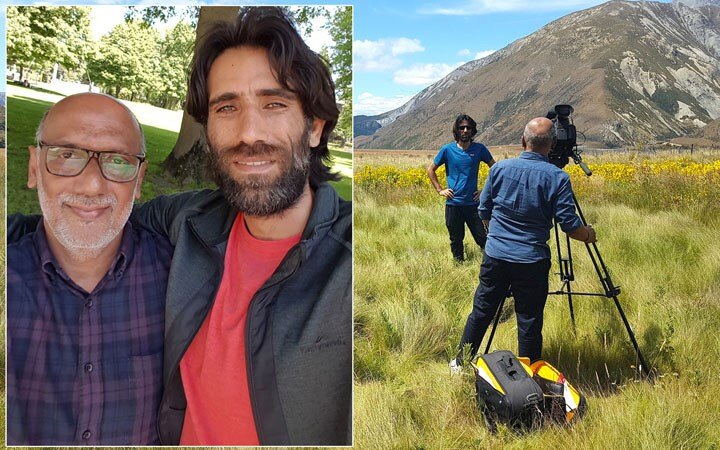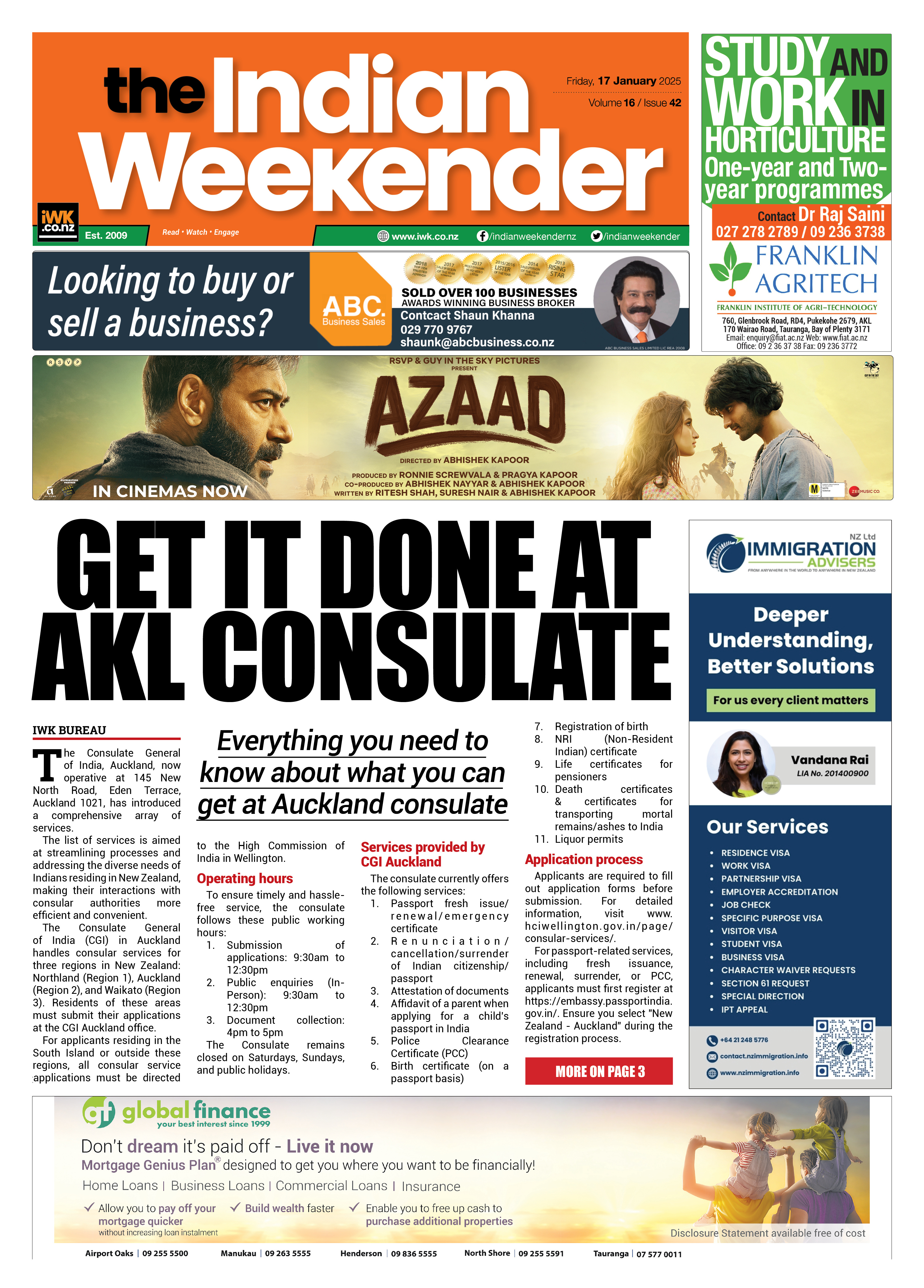Simon V Kurian: Giving a voice to refugees and asylum seekers

Known for his feature documentaries on sensitive subjects like international refugees, asylum, and human rights, Simon V Kurian is an acclaimed Indian-Australian filmmaker with a keen sense of empathy. His recent documentaries Stop the Boat and Behrouz have specifically been instrumental in creating awareness about the plight of asylum seekers globally.
His work has won several awards and accolades for bringing focus to often demonised and persecuted refugees. Behrouz Boochani, on whose story Kurian based his documentary, spent more than five years in the Australian-run Manus Island detention centre before he was granted asylum in New Zealand. Behrouz now lives in Christchurch.
In a conversation with the Indian Weekender, he talks about his journey, his work, and what compelled him to focus on the plight of international refugees.
Tell us something about yourself and your background?
I grew up in the Southern Indian state of Kerala and studied photography in England. I then moved to Pasadena, Califronia to study filmmaking at the Art Center College. While studying there, I made my first documentary 'Shiva's Disciples' for the BBC, which was about the three traditional dances of Kerala. The film was narrated by Sir Richard Attenborough. I went on to make few more documentaries for BBC and for other international networks as a director and cinematographer. I am now based in Australia and since 2011 I have been making independent feature documentaries for theatrical release.
What directed your attention to the asylum seekers and how did the idea of 'Stop the Boat' come about?
I was deeply concerned about the Australian asylum seeker policy ever since Prime Minister John Howard refused to allow the 400 stranded Afghan asylum seekers to enter Australia after being rescued by the cargo vessel Tampa in 2001. New Zealand under Prime Minister Helen Clark, and Minister for Immigration Lianne Dalziel had to step in to do the right thing and give those stranded asylum seekers refuge.
People seeking asylum on Australian shores by boat were further demonised and used as a political tool in the 2013 election by both major political parties. The Liberal Party under Tony Abbot used the slogan Stop the Boats as a battle cry in their election campaign. I decided to make a film to expose the lies and to amplify the voices of those who were locked up since July 2013 in Manus and Nauru Islands including children. I started making this film in 2015.
Stop the Boats is based on the stories of asylum seekers including children from within detention centres, through footage secretly filmed on mobile phones and smuggled out from Nauru and Manus Island on USBs, few shots at a time. Set against interviews with whistle-blower detention centre workers, the film tells harrowing stories of the child abuse and criminal neglect. Behrouz was also featured in this film.
The film was released in 2018 and had several screenings in cinemas across Australia. The film was screened in 15 international film festivals and was the Centrepiece of the Human Rights Arts and Film Festival in Melbourne that year and the opening film for the festival in Canberra. The film won several nominations and awards as best feature documentary and several special awards. The film was also screened in universities and is recommended viewing for Year 12 students in Western Australia.
How has the story of Behrouz Boochani personally impacted you?
Working on Stop the Boats and Behrouz was undoubtedly emotionally draining. It's challenging to sit in the editing room and repeatedly listen to stories of self-harm, despair, and hopelessness, especially those of children. Amongst all this, Behrouz was a source of relief because he was such a representation of survival and resilience. As much as I'd like to be a detached neutral observer, it's hard to remain unaffected. There were many occasions when I had to stop and walk away from editing because it was too emotionally taxing. Seeing Behrouz in Christchurch as a free man and seeing him arrive there for the first time was a joyful and incredible moment for me.
For me working with Behrouz has been eye-opening. Here was a man who, like the over 2000 men like him in Manus had fled his home, left everything and everyone he knew to seek a safe harbour from persecution. What set him apart and what made me want to make this film with him is how he set aside his natural inclination of being quiet and introspective, to take the leadership to represent others like him, using his ability to write and report, despite the dangers it posed for him. His courage is immense. He is a contemplative man who spoke up and spoke loudly and found a way to get his voice heard, not on his own behalf but for those who were wrongly detained like him for legitimately seeking asylum. When you get to know him, you will see how he constantly tries to shift the conversation away from himself to the cause of others and the big picture. He always saw himself as the voice of many, rather than as this being about him. He is also deeply creative in how he sees and experiences the world.
Do you think the documentary will be able to change the perception that wider communities have about refugees and asylum-seekers?
I sincerely hope so. I made both Stop the Boats and BEHROUZ with the intention that these two films should remain as a testimony to this ugly period of Australian politics and history, which demonised people seeking asylum and violated every human right and abrogated the international refugee conventions that Australia signed on to. As we speak, the number of people displaced due to persecution and conflict has reached 100 million. All nations around the globe, especially the west, who are signatories to the refugee convention and in many instances have a direct hand in the conflicts that cause the displacement, have a responsibility to provide safety to these people.
When I chose the three-word slogan 'Stop the Boats' that represented the horrific policy, as my film's title, many people cautioned me against it. But, by choosing those very three words as the title of the film I wanted the film to remind generations of the brutal and illegal Australian policy that destroyed the lived of thousands, holding them in limbo in offshore detention for years without end; going against all humanitarian precepts and international conventions on refugees to which they are signatories.
How can the audience in NZ watch the documentary in case they have missed it?
We are hoping to host another screening in Wellington in the coming months. Once the film has all its Australian premiere and general release and festival screenings, we will release the film through one of the streaming platforms.
What message would you like to give out to your audience before they watch the film?
My message would be to hear the truth and understand the lies of the government. Do further reading and research to understand the true plight of people seeking asylum. Also, stop believing the government when they say seeking asylum by boat is illegal. An asylum seeker is allowed to enter a country by any means and seek protection. Also, the audience should know that other countries are now copying Australia; like UK is doing by sending asylum seekers to Rwanda, a country UK has taken to the international Court for serious human rights violations.
The Australian Policy and the UK policy are ultimately based on racism and a colonial mentality and the ideas of white supremacy.
Tell us about your future projects.
While I have many ideas for other documentaries, I have not decided on any particular project at the moment. I am currently busy promoting Behrouz. I am also working with my daughter Sarah who finished her film studies and is making a film in Tamil Language in India based on the classic novel Little Women by Louisa May Alcott. I will be doing the cinematography and editing for this, and we hope to start shooting mid 2023.



